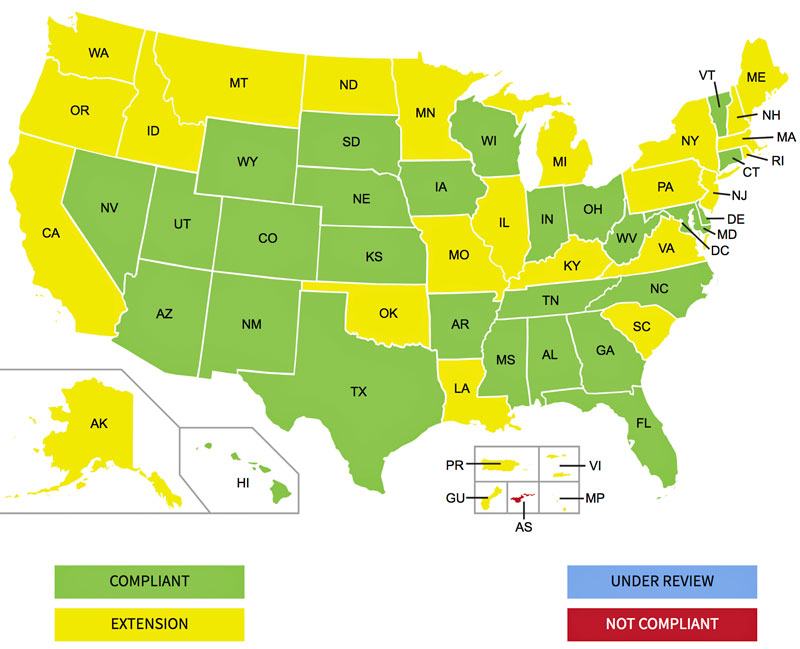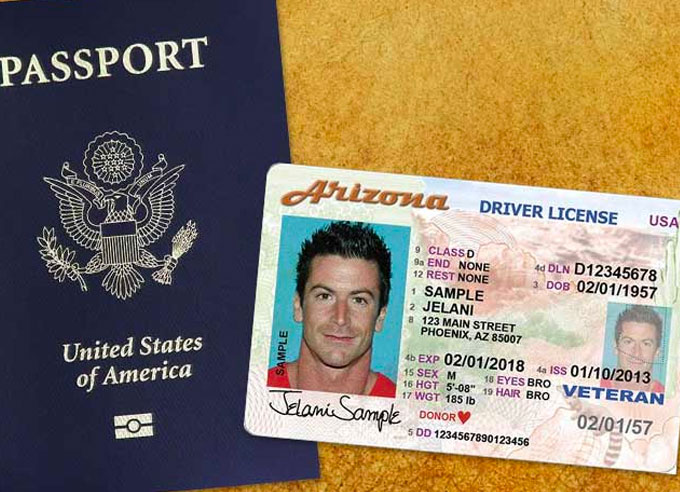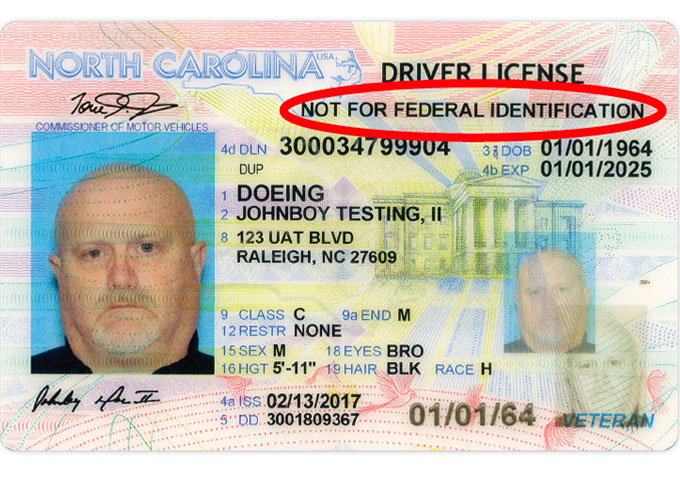As of January 22, 2018, the Department of Homeland Security (DHS) will begin to enforce compliance with the Real ID Act to better protect the American people.
Fifty-five out of fifty-six states and territories are currently compliant or have received an extension until October 10, 2018.
Passengers who have licenses issued by a state or territory that is compliant or has an extension to become compliant with REAL ID requirements may continue to use their licenses as usual.
DHS has worked extensively with every state and territory to provide time, technical assistance, and grants to support compliance with the REAL ID security requirements.
Current Status of States / Territories

NOTE: For states that are not compliant, REAL ID enforcement begins on February 5, 2018.
As of today, American Samoa is the only territory still under review.*
- Beginning February 5, 2018, residents of American Samoa will no longer be able to use territory-issued driver’s licenses or identification cards to fly domestically, or enter federal buildings and military installations.
- American Samoa formerly had an extension that allowed federal agencies to continue to accept its driver’s licenses and identification cards.
- However, that extension expired on October 10, 2017, triggering a three month grace period before enforcement would begin on February 5, 2018.
- American Samoa has subsequently not been able to demonstrate a clear achievable plan for compliance as needed to receive a new extension.
DHS continues to work with American Samoa on what actions it can take to receive a new extension. (To learn more, see at bottom.)
(Congress passed the Real ID Act in 2005. The law sets new validity requirements for state driver’s licenses. Learn More, courtesy of Newsy and YouTube)
Background on REAL ID
Based on a recommendation of the bipartisan 9/11 Commission, REAL ID is a coordinated effort by the states and the federal government to inhibit terrorists’ ability to evade detection by using fraudulently-obtained driver’s licenses and identification cards.
The REAL ID Act was passed by Congress in 2005, and is designed to ensure that people boarding a flight or entering a federal building are who they say they are.
REAL ID established minimum security standards for state-issued driver’s licenses and identification cards.

This includes incorporating anti-counterfeiting technology, preventing insider fraud, and using documentary evidence and record checks to ensure a person is who he or she claims to be.
It also prohibits federal agencies from accepting non-compliant licenses and identification cards for access to federal facilities, nuclear power plants, and commercial aircraft.
The goal of REAL ID is to improve the reliability and accuracy of state-issued driver’s licenses and identification cards used for Federal official purposes.
Because of the potential for confusion about the REAL ID enforcement milestones, residents can use the following guidelines to be fully informed and prepared.
- Be aware of your state’s status.
- You can check if your state is REAL ID compliant or has an extension at www.dhs.gov/real-id.
- Read answers to frequently asked questions at www.dhs.gov/real-id-public-faqs.
- Bring identity documents to the airport that are acceptable for flying domestically.
- TSA provides a list of acceptable documents at www.tsa.gov/travel/security-screening/identification.
- If you need to obtain a new form of ID, please allow sufficient processing time before you travel.
- For example, the current processing times for U.S. passports are 6-8 weeks for routine service and 2-3 weeks for expedited service.
DHS is working closely with all states and territories to implement their REAL ID requirements and stands ready to provide additional assistance as needed.
Notice from DHS to American Samoa on REAL ID Enforcement*
IMPACT ON AMERICAN SAMOA RESIDENTS
As a result of the January 19, 2018 decision, a driver’s license or ID issued by American Samoa (AS) will no longer be an acceptable document to board a federally-regulated commercial aircraft.

American Samoa is the only state or territory that has not reached compliance or received an extension.
As a result, starting February 5, 2018, American Samoan residents should bring to the airport an identity document acceptable to TSA. TSA has provided a list of acceptable documents here.
To allow for a smooth transition, between February 5, 2018 and May 6, 2018, TSA will provide assistance to American Samoans who arrive at an airport without an acceptable identification document.
- For federal buildings and military bases, REAL ID only affects locations where individuals are required to present an identification document for access.
- It does not require individuals to present identification where it is not otherwise required.
- When planning a visit to a Federal facility or military base, residents of American Samoa should contact the facility to determine what, if any, identification is needed for access.
DHS has provided grants and offers technical assistance to support compliance with the REAL ID security requirements.
The women and men of DHS will continue to work tirelessly to put protections in place to keep our country and our people safe.


















